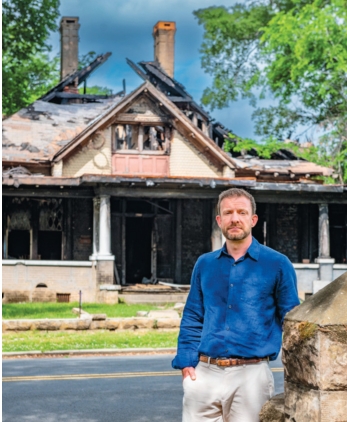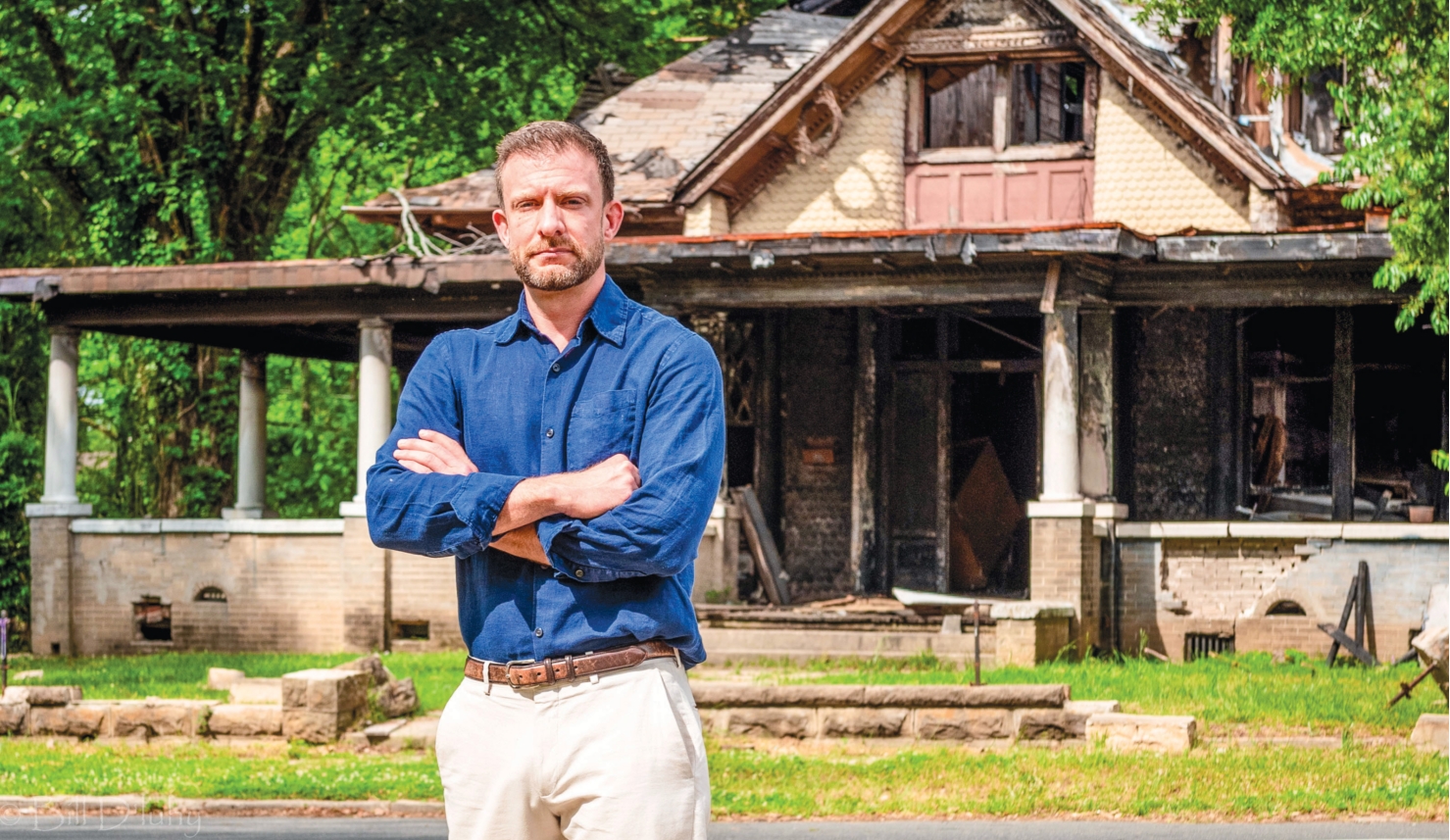Taking the City to Task

The home of an elderly lady, Miss Lu, was damaged by a fire which destroyed a house next door.
JOHN-PAUL YOUNG’S CRUSADE AGAINST FIRES AND SQUATTERS
Fires in Shreveport’s historic Highland neighborhood have kindled a semantic battle between two branches of local government over the interpretation of state and local statutes concerning private property habitation.
At the heart of the debate, but hardly the main problem, is what constitutes trespassing, squatting, and what property owners must do to protect themselves.
There is general agreement that a significant number of the Highland neighborhood fires may have been started through the negligence or misadventure of people who were occupying the properties in some fashion when the fires occurred.
Caddo Parish Commissioner John-Paul Young represents District 4, which includes Broadmoor, Anderson Island and Shreve Island, but he lives in the Highland neighborhood.
“There is a problem in our neighborhood of meth use and people who do not have a place to go,” Young said. “They’re wandering around, and there aren’t many homeless shelters that can take people in when they’re on drugs.
“They mostly inject meth. We find needles everywhere when we do neighborhood cleanups, especially in structures like vacant houses and sheds or torn-up properties with broken windows and no power.”
Young said one of the side effects many meth users exhibit is carelessness with fire. When occupying abandoned or dilapidated structures, that carelessness can and has caused houses and property to be damaged or destroyed. One particularly hard-hit area is around the intersection of Gilbert and Kings Highway.
“The two blocks north of there, Rutherford and Columbia on the 400 block, have been hit sort of the hardest in some ways.”
About 18 months ago, a house Young could see from his own residence caught fire. The owner had died, and the property had not yet been resold. Young said people started camping there. He said, despite complaints, police said they could not arrest the people.
The issue is an interpretation of a section of the Occupancy and Possession section of the Louisiana statute which says, a “squatter” is a person who occupies, possesses or trespasses on the immovable property of another without legal authority, does not own, rent or lease the property, and the owner did not acquiesce to the occupancy or possession.”
To remove a squatter, the property owner must file a petition seeking “removal of the squatter who attempts to occupy or exercise corporeal possession of immovable property adversely to the rights of the lawful possessor.”
However, property owners might argue that the individuals should be arrested for trespassing, and that’s where the interpretive issue gets sticky. In and of itself, squatting is not illegal in Louisiana. It becomes unlawful if the person ignores a written eviction notice, tries to present false papers claiming ownership or causes a public nuisance.
But what exactly is trespassing? The Louisiana law governing trespass says, “No person shall, without authority, go into or upon, or remain in, or attempt to go into or upon, or remain in or upon, any structure, watercraft or any other movable or immovable property which belongs to another, after having been forbidden to do so, either orally or in writing, including by means of any sign described in this chapter, by any owner, lessee or custodian of the property or by any other authorized person.”
The key is “after having been forbidden” to be on another’s property. So, police cannot arrest or remove a “squatter” forcibly, nor compel a “trespasser” to vacate a property unless it can be proven that the alleged perpetrator was forbidden to occupy the property. So, technically, a squatter is not trespassing until the property owner makes it clear they are not welcome on the property in a manner that satisfies the legal system.
Landlords and owners can remove squatters through a standard eviction, but they cannot be removed forcibly, according to Louisiana law.
Young disagrees with this interpretation. “[Shreveport Police] said the law about trespassing requires the owner to be there complaining. Or register a sign in a program that they have for registering signs. However, that program only exists for commercial businesses, and it has never occurred to them to do it for residents. Also, it’s not required by the law. That’s just a Shreveport Police policy to make fewer arrests.”
What stirred Young’s ire most was a fire in January in which another house was ravaged.
“This time, a house was vacant, and people just moved in there and would come and go. They weren’t setting up a life there; they were just using drugs and prostitutes and stealing and putting the junk they stole in their front yard. The neighbors complained about that, and nobody would arrest them. They were sure that they weren’t supposed to be there because the owner wasn’t there to complain. But it was obvious to everybody.
“That house burned down. It actually burned twice. The first time, they put it out. The second time, people were back in there again, and they still didn’t get arrested even though it was a burnt house.
And they burned it down completely (this time) because the fire hydrants weren’t working. So, it was very hard to put out the fire, and it burned the two houses that were next to it, which were inhabited. One was inhabited by an old Black lady, Miss Lu. She’s now homeless because the fire burned her house up, and it was her only asset.”
A neighborhood meeting was called to discuss the issues, and about a hundred people attended it, according to Young. He said the mayor, the district’s city councilman, the police chief, a representative of Property Standards and fire department officials attended.
“Our city councilman pulled out a copy of this law, the updated law about trespassing in Louisiana. They just added two clauses about squatters that say a squatter is somebody who remains on a property without authorization, and squatting is trespassing. A squatter is a person who has been told to leave already.
“He said, now we’ve got this updated law, and we can start arresting trespassers, so they won’t burn down these houses anymore. Everybody thought that was fantastic.
“Then the police got up and said we can’t arrest people for trespassing because we’re not sure they’re not supposed to be there.”

John-Paul Young is on a crusade to battle fires caused by trespassers in the city.
Young said that at a subsequent meeting he had as a member of the Caddo Commission, the fire chief admitted it was a strain on his department to fight these structure fires. “He suggested that he agreed with me that we can arrest these people because we know that they’re not supposed to be there, even if we can’t get the owner on the phone.”
According to Young, the assistant police chief also attended the meeting and repeated the assertion that arresting a trespasser was difficult because the responding officer would have to be positive the person was not supposed to be on the property.
Shreveport Mayor Tom Arceneaux said he wishes Young had approached the situation differently. “There was a meeting on the 23rd of January of the Highland Neighborhood Association. People expressed their concerns. And there was some general feeling that Section 63 of the Louisiana Criminal Code was a kind of panacea for solving the problem. I looked at it. The chief looked at it, but he expressed his concerns after the meeting. After the meeting, I looked at it and began understanding why the chief had concerns.”
Arceneaux said his administration began looking for other ways to approach the situation, ultimately resulting in an amendment to Shreveport’s property standards ordinance covering dilapidated structures without water service. “That simply took the need to contact the owner or even know who the owner was out of the equation. That’s what we did, and as soon as that became effective, the police carried out their first raid, for lack of a better term. They visited 50 properties, made several arrests and cleared out some other properties. It also provided information about alternative living arrangements for people who might have been in those houses.
Young characterized the revised standards as another problem. “[Mayor Arceneaux] proposed passing a different law making it illegal to inhabit a property that is blighted and, specifically, has no water connection. I think that law is worse because it applies to owners, too, and I think it makes it a criminal act, a misdemeanor act, to get your water disconnected, like if you ran out of money or something. Then you could conceivably be arrested for that. I don’t like that.”
Young, however, admitted that the police sweep had positive effects. “The neighborhood now is in better shape because some people have been arrested for being in houses that didn’t have a water connection. That seems likely to have resolved the problem somewhat.”
“I think it’s been very successful,” the mayor said.
